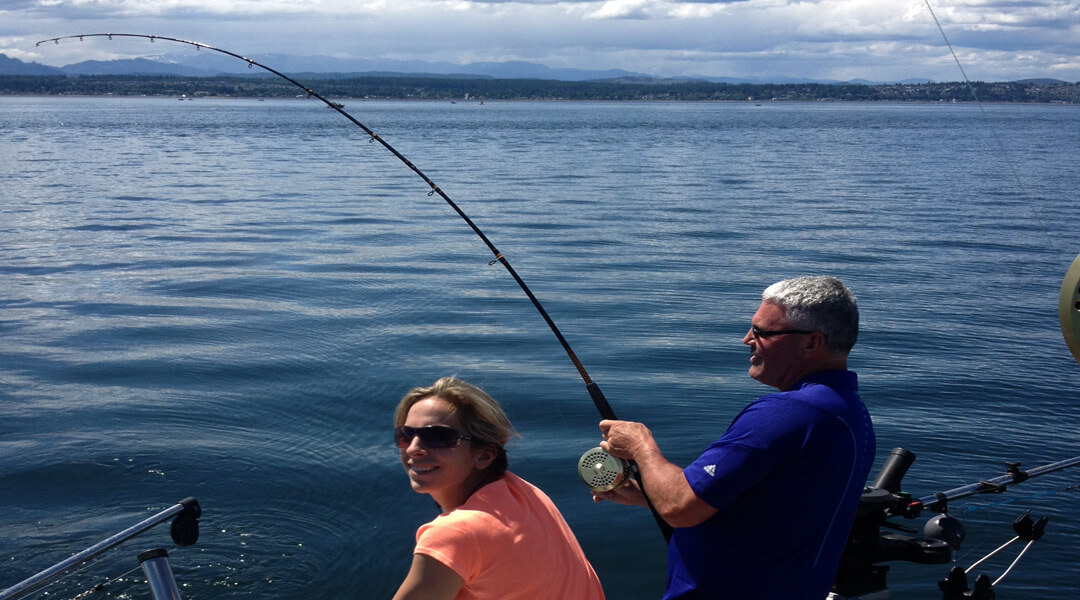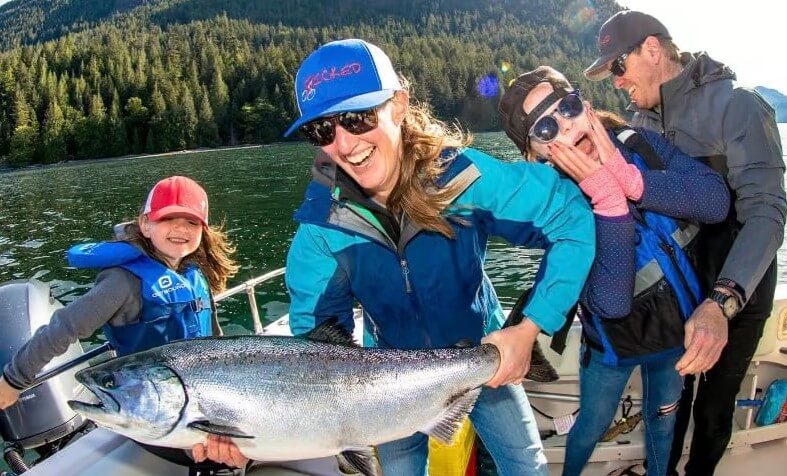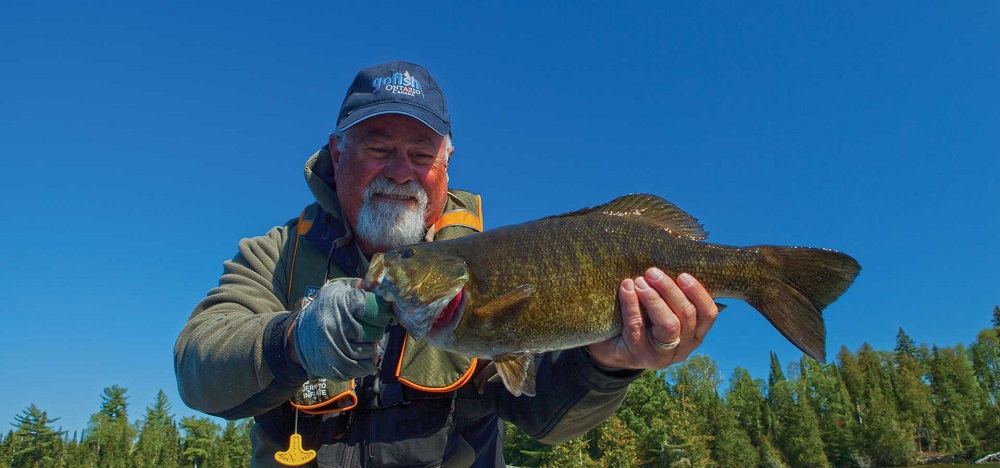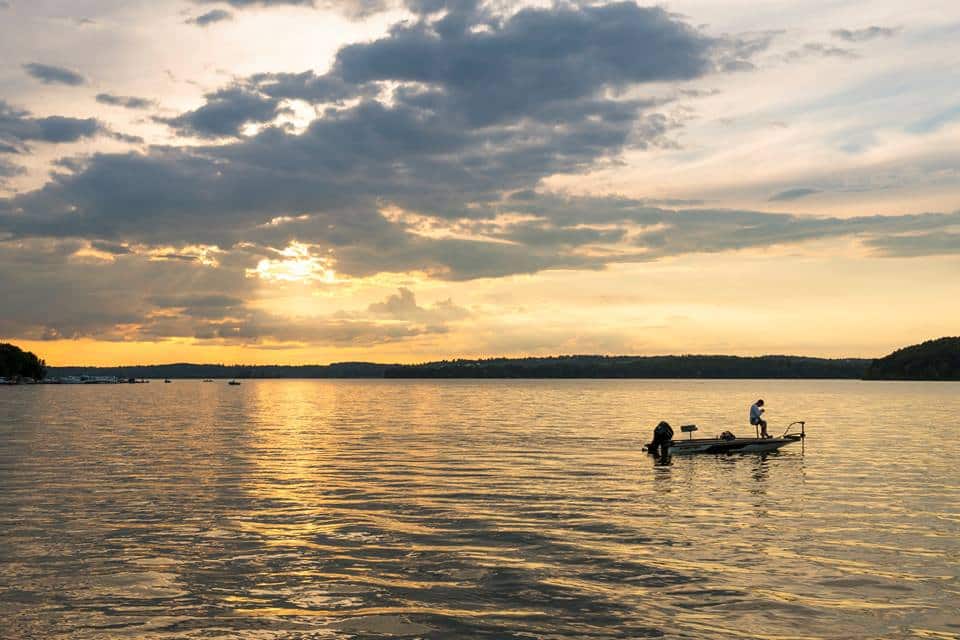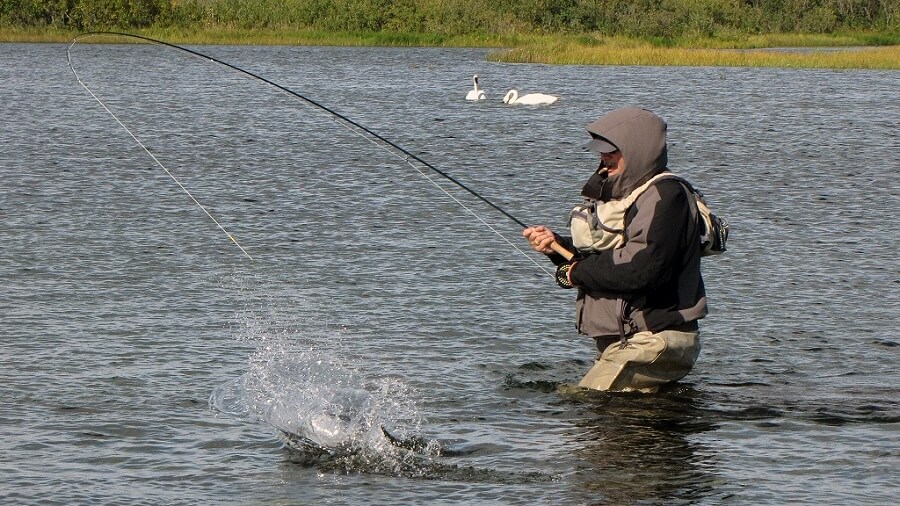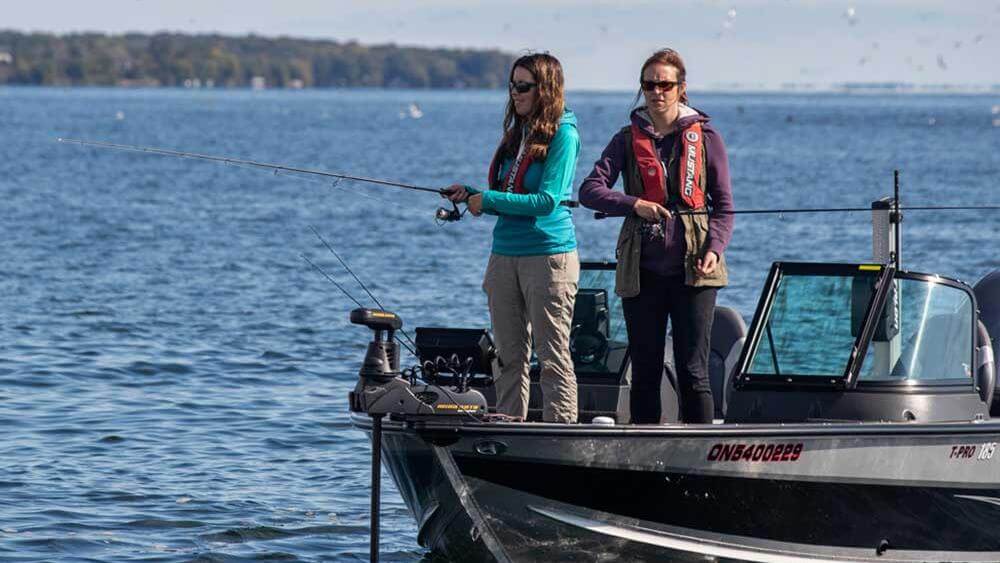Fishing enthusiasts often struggle to find the perfect fishing destination with an unforgettable experience and abundant fish.
Imagine spending hours on the water, only to return empty-handed, frustrated and disappointed. Investing time and money in a fishing trip that doesn’t meet your expectations is disheartening.
Campbell River Fishing is your ultimate solution for an incredible fishing adventure. In British Columbia, Canada, Campbell River is known as the “Salmon Capital of the World.” Its pristine waters and diverse marine life offer a haven for anglers seeking a thrilling experience.
At Campbell River Fishing, we provide expert guides who know the best spots for catching salmon, halibut, trout, and more. Our well-equipped boats and top-notch gear ensure you have everything you need for a successful fishing trip.
Whether you’re a seasoned angler or a beginner looking to learn the ropes, Campbell River Fishing has something for everyone. Experience the thrill of reeling in trophy fish surrounded by breathtaking scenery and wildlife.
Don’t settle for mediocre fishing trips anymore. Choose Campbell River Fishing for an unforgettable adventure that will leave you with lifelong memories and stories to share.
The Fishing Paradise of Campbell River
Campbell River, located in British Columbia, Canada, is a renowned destination for fishing enthusiasts. Known as the “Salmon Capital of the World,” this picturesque city offers abundant opportunities for anglers to indulge in their passion. From its pristine rivers and lakes to its breathtaking coastal waters, Campbell River boasts some of the finest fishing spots in the region.
One of the main attractions for fishing in Campbell River is salmon fishing. Millions of Pacific salmon return to the local waters yearly, making it a prime recreational and sport fishing location. The city’s strategic location at the confluence of two major rivers, the Campbell River and Quinsam River, ensures a steady migration of various salmon species throughout the year.
Fishing enthusiasts visiting Campbell River can enjoy a variety of techniques, such as fly fishing, spin casting, or trolling, to catch these iconic fish. Local charters and guides are available to provide expert knowledge and assistance to ensure an unforgettable fishing experience.
Besides salmon fishing, other species can be targeted in Campbell River’s abundant waters. These include steelhead trout, cutthroat trout, lingcod, halibut, and various rockfish species. With such diverse options available year-round, anglers can always find something exciting to pursue regardless of the season.
When choosing specific fishing spots in Campbell River, numerous onshore and offshore options are available. Some popular locations include Tyee Pool at Discovery Pier for salmon angling from shore or boat; Quinsam Hatchery area known for its steelhead trout; or even venturing further into Discovery Passage or nearby islands for saltwater adventures.
It’s important to note that a valid British Columbia freshwater or saltwater fishing license is required before engaging in any recreational angling activities in Campbell River. Additionally, respecting local regulations on catch limits and conservation efforts is crucial to preserving these valuable fisheries for future generations.
Campbell River offers an angler’s paradise with its stunning natural beauty and bountiful fish populations. Whether you are a seasoned fisherman or a novice looking to cast your first line, this coastal gem provides an unforgettable fishing experience that will keep you hooked for years.
The Top Fishing Spots in Campbell River
If you’re an avid angler looking for incredible fishing opportunities, you’ll be delighted to explore the abundance of fishing spots in British Columbia, Canada. Among the popular destinations are Discovery Passage, Tyee Pool, Quinsam River, and Nootka Sound.
Discovery Passage offers an unforgettable fishing experience with its diverse marine life. Situated between Vancouver Island and mainland British Columbia, this passage is known for its salmon runs. Anglers can target species like Chinook (King) salmon, Coho (Silver) salmon, and Pink salmon. The area is also home to other fish species like halibut and lingcod.
Tyee Pool is a legendary spot located near Campbell River on Vancouver Island. This area gained fame for its world-class Chinook salmon fishery. Anglers flock to Tyee Pool every year in pursuit of the elusive “Tyee” – a Chinook salmon weighing 30 pounds or more. The thrill of battling these massive fish attracts anglers from all over the world.
Quinsam River, situated near Campbell River, is another fantastic fishing destination. Known primarily for its fall-run Chinook and Coho salmon, this river provides ample opportunities for anglers to test their skills. Through conservation efforts, the Quinsam River Hatchery is vital in supporting healthy salmon populations.
Nootka Sound is an ideal choice for those seeking an adventurous fishing experience on the west coast of Vancouver Island. This remote coastal area offers excellent opportunities for catching Chinook and Coho salmon and halibut, lingcod, and rockfish. Nootka Sound’s stunning scenery and thrilling angling make it a must-visit location for any passionate fisherman.
Whether you’re looking to reel in trophy-sized Chinooks or enjoy a relaxing day on the water surrounded by natural beauty, these four fishing spots offer something unique for every angler’s taste. So pack your gear and prepare for an unforgettable fishing adventure in the stunning waters of British Columbia.
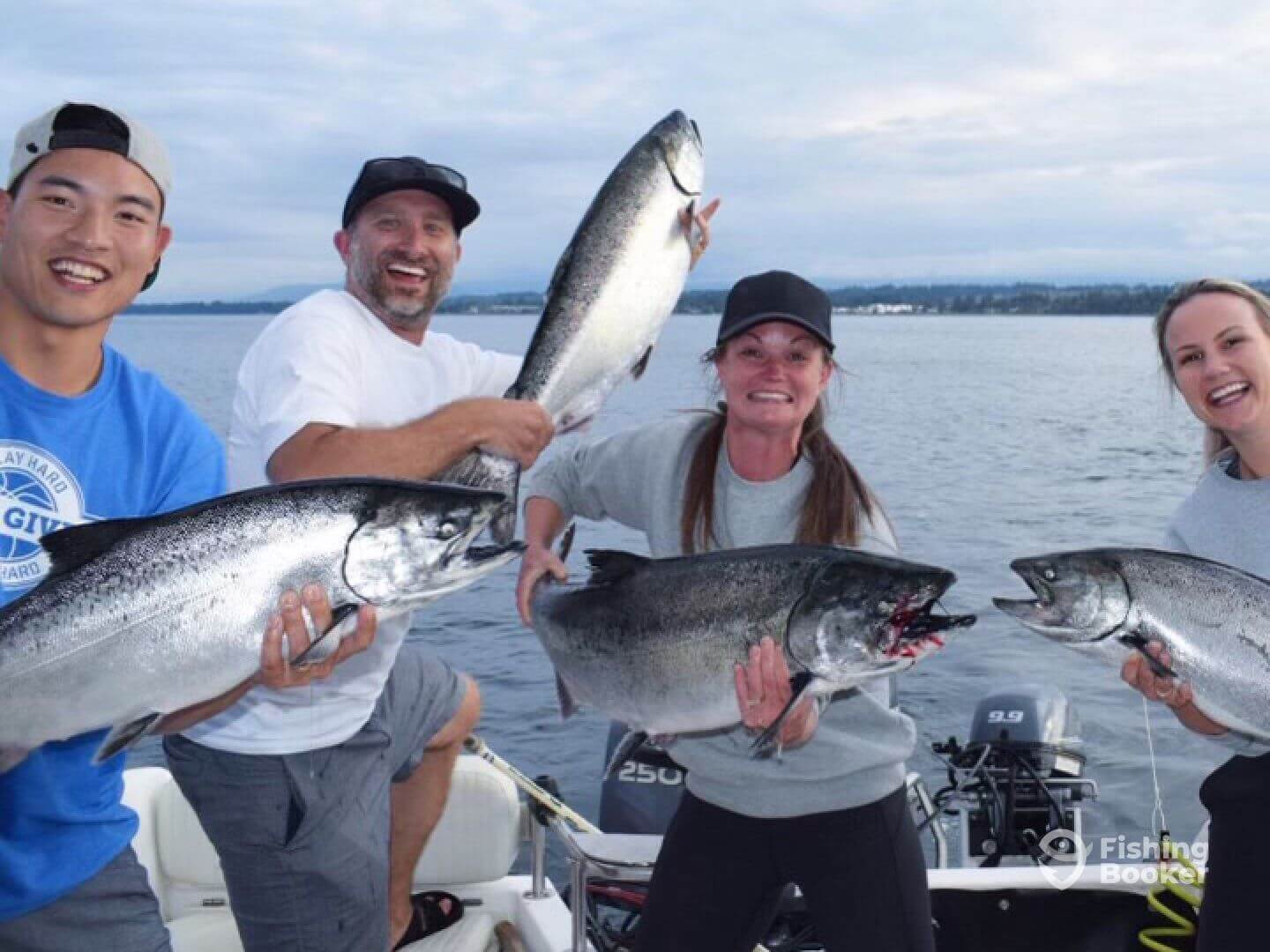
1. Discovery Passage Fishing
Campbell River, located on the eastern shore of Vancouver Island in British Columbia, Canada, is renowned for its exceptional salmon fishing opportunities. Situated at the mouth of the Campbell River and adjacent to the Discovery Passage, this picturesque coastal town offers a haven for avid anglers seeking thrilling fishing experiences.
One of the popular fishing activities in Campbell River is bottom-fishing in Discovery Passage. With its nutrient-rich waters and diverse marine ecosystem, this region attracts a wide range of bottom-dwelling species, such as lingcod, rockfish, and snapper. Anglers can enjoy the thrill of reeling in these feisty fish while taking in breathtaking views of the surrounding coastal mountains.
Halibut fishing in Discovery Passage is also sought-after among locals and visitors. Known for their impressive size and strength, halibut provides an exhilarating challenge for anglers. These flatfish can weigh up to several hundred pounds, making every catch a memorable experience. The rugged beauty of Discovery Passage enhances the overall fishing adventure as anglers navigate through its pristine waters.
Campbell River’s strategic location offers excellent access to prime fishing grounds throughout the year. Whether you are an experienced angler or a novice looking to try fishing, numerous charter operators and guides offer their expertise and ensure a successful outing.
In conclusion, Campbell River presents abundant opportunities for salmon fishing and exciting bottom-fishing and halibut fishing experiences in Discovery Passage. Its stunning natural surroundings, combined with the availability of knowledgeable guides, make it an ideal destination for those seeking unforgettable angling adventures on Canada’s west coast.
2. Tyee Pool Fishing
Tyee Pool, located in Campbell River, British Columbia, is renowned for its exceptional salmon fishing opportunities. Fly-fishing for salmon in this area requires skill, technique, and knowledge of the fish’s behaviour. To maximize your chances of success, it is important to understand the specific methods and tips that can help you reel in these prized fish.
One effective technique for fly-fishing in Tyee Pool is a sinking line. Salmon swim at varying depths depending on water temperature and light conditions. Using a sinking line, you can present your fly at the desired depth where the salmon will likely feed.
Another important tip is to choose the right fly pattern. Different fly patterns mimic various prey species that salmon feed on, such as herring or anchovies. It is advisable to have a selection of flies in different sizes and colours to match the prevailing conditions and preferences of the fish.
In addition to selecting the appropriate fly pattern, it is crucial to present your fly accurately and convincingly. This involves mastering casting techniques such as roll casts or double hauls, which allow you to place your fly precisely where you want it. Practice these casting techniques beforehand to make accurate casts even under challenging conditions.
Furthermore, understanding how tidal movements affect salmon behavior can significantly enhance your fishing experience in Tyee Pool. Salmon are known to follow tidal currents as they migrate upstream or downstream. Timing your fishing trips during specific tide phases when salmon are more active can significantly increase your chances of success.
Lastly, patience and persistence are key in fly-fishing for salmon in Tyee Pool. These fish are known for their strength and fighting spirit once hooked, so be prepared for an exhilarating battle once you feel that tug on your line.
By following these techniques and tips while exploring Tyee Pool’s abundant waters, you will have a greater chance of landing that prized salmon and creating unforgettable fishing memories.
3. Quinsam River Fishing
The Quinsam River is a renowned destination for fly-fishing enthusiasts, particularly for steelhead and trout fishing. This river offers a unique and rewarding angling experience in British Columbia, Canada.
Steelhead fishing on the Quinsam River is highly sought by novice and experienced anglers. These elusive fish are known for their strength and acrobatic leaps, making them a thrilling catch. With fly-fishing techniques, anglers can target these prized fish as they go up the river during their annual migration.
Trout fishing on the Quinsam River is equally captivating. The river is home to abundant rainbow trout, providing excellent opportunities for anglers to test their skills. Whether you prefer dry-fly or nymph fishing, the Quinsam River offers diverse habitats and feeding grounds that attract trout throughout the year.
Anglers visiting the Quinsam River can expect stunning natural scenery as they cast their lines. Surrounded by lush forests and breathtaking mountain views, this picturesque setting adds to the overall experience of fishing on this beautiful river.
It’s important to note that proper licensing and adherence to local regulations are required when engaging in fly-fishing activities on the Quinsam River. Conservation efforts are also encouraged to ensure the sustainability of these fish populations for future generations of anglers to enjoy.
Overall, fly-fishing for steelhead or trout on the Quinsam River provides a memorable angling adventure in a stunning natural environment. Whether seeking an adrenaline-filled challenge or simply enjoying being immersed in nature, this river offers an exceptional fishing experience that will keep you hooked.
4. Nootka Sound Fishing
Nootka Sound, located on the west coast of Vancouver Island, is a renowned fishing destination for avid anglers. This pristine body of water offers thrilling opportunities for fishing enthusiasts to target various species, including Chinook and Coho salmon, halibut, and lingcod.
Regarding salmon fishing in Nootka Sound, both Chinook (also known as King) and Coho (also known as Silver) salmon are highly sought after. These species are known for their size and fighting spirit, providing anglers with exhilarating battles on the water. The peak season for Chinook salmon runs from June to September, while Coho salmon can be targeted from July to October.
Halibut fishing in Nootka Sound is another popular pursuit among anglers. These flatfish can grow to impressive sizes and offer a challenging fight when hooked. The waters of Nootka Sound provide ample opportunities to catch halibut throughout the summer months. Anglers often find success by targeting areas with rocky bottoms or near underwater structures where these bottom-dwelling fish tend to congregate.
Lingcod fishing is yet another exciting option in Nootka Sound. Lingcods are aggressive predators that inhabit rocky reefs and kelp beds. Anglers can target these voracious fish using techniques like jigging or casting artificial lures near submerged structures. The best time for lingcod fishing is typically from late spring through early fall, when they are most active.
Whether you’re interested in chasing after the prized Chinook and Coho salmon or seeking the thrill of battling halibut and lingcod, Nootka Sound offers abundant opportunities for anglers of all skill levels. With its stunning natural beauty and rich marine ecosystem, this region has rightfully earned its reputation as a premier fishing destination on Vancouver Island’s west coast.
Tips and Techniques for a Successful Campbell River Fishing Experience
Campbell River, located on the east coast of Vancouver Island in British Columbia, Canada, is renowned for its exceptional fishing opportunities. If you’re planning a fishing trip to Campbell River and looking for gear recommendations, you’ll first need a good quality fishing rod and reel combo suitable for your fishing type.
For salmon fishing in Campbell River, which is particularly popular, it’s recommended to use medium-heavy to heavy action rods with a length between 8.5 to 10 feet. Match your rod with a sturdy reel that can handle the size and strength of salmon species in these waters.
Regarding bait and lures, popular choices for salmon include herring, anchovies, spoons, spinners, and plugs. Depending on the time of year and specific conditions during your visit to Campbell River, it’s advisable to consult with local tackle shops or experienced anglers for updated recommendations on bait preferences.
Now, let’s talk about the best time to fish in Campbell River. The area offers year-round angling opportunities; however, certain seasons are more productive. The prime time for salmon fishing typically spans from June through September, when various species migrate through these waters.
During this period, you can target Chinook (King) salmon from June through July as they make their way toward their spawning grounds. When they return from their oceanic journey, August and September are prime months for Coho (Silver) salmon fishing.
Additionally, if you’re interested in bottom-fishing or targeting other species, such as lingcod or halibut, in Campbell River’s coastal waters, late spring through summer months tend to offer favourable conditions.
To optimize your angling success further while visiting Campbell River or any other location along the coastlines of British Columbia, where tides play an essential role in fish movements and feeding patterns – referring to tide charts is highly recommended. These charts provide important information about the ebb and flow of tidal waters, which can impact fish behaviour and feeding times.
Local tackle shops, fishing guides, or online resources can provide accurate tide charts specific to Campbell River. By aligning your fishing trips with favourable tide conditions, you increase your chances of a successful angling experience.
Always check local regulations and obtain any necessary licenses or permits before embarking on your fishing adventure in Campbell River. Respecting conservation guidelines and practicing ethical angling ensures the sustainability of the fisheries for future generations of anglers to enjoy.
The Thrill of Salmon Fishing
Sockeye salmon, or red salmon, are known for their incredible annual migration up the Adams River in British Columbia. This natural phenomenon attracts thousands of visitors annually who witness this breathtaking spectacle. The exact dates for the 2021 sockeye salmon run on the Adams River can vary, but it typically occurs between late September and early October.
Looking ahead to 2022, let’s shift our focus to pink salmon. Pink salmon runs in BC rivers occur every two years, with significant runs expected in even-numbered years. While it is challenging to forecast specific dates this far in advance, experts predict that pink salmon runs will likely occur during the summer and early fall of 2022.
Lastly, we cannot overlook the Coho salmon when discussing salmon migration patterns. These fish are known for their remarkable ability to navigate long distances from the ocean back to their freshwater spawning grounds. Coho salmon usually begin their migration around late summer or early fall, depending on various environmental factors such as water temperature and river flow.
It’s important to note that while these patterns provide a general understanding of sockeye, pink, and Coho salmon migrations in British Columbia rivers, nature can be unpredictable. It may be beneficial to consult local authorities or organizations dedicated to studying and preserving these magnificent fish species to get more accurate information about specific dates and locations for these events.
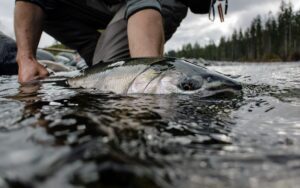
How to Catch Salmon?
It’s that time of year again! The salmon are running in Campbell River, and anglers converge on the area to try their luck at hooking into these prized fish. If you’re planning on spending some time fishing for salmon in Campbell River this season, here are a few tips to help you increase your chances of success.
First, be sure to use the right gear. Salmon can be quite large and powerful, so it’s essential to have a tackle that can handle fish of this size. Second, take advantage of the local knowledge by talking to the experts at the local tackle shops and charter companies. They can tell you what type of bait or lures have been working well and where the fish are biting.
Finally, remember that timing is everything when it comes to salmon fishing. Pay attention to the tides and fish during periods of high water activity. This is when the salmon are most active and likely to bite. By following these tips, you’ll be sure to have a successful and enjoyable Campbell River salmon fishing season!
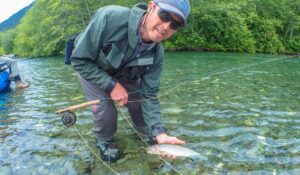
Tips for Catching More Salmon
As the weather warms up and the days get longer, many anglers start thinking about heading to Campbell River to fish for salmon. Here are a few tips to help you increase your chances of success:
1) Understand the tides. Salmon tend to feed more actively during certain tide phases, so knowing when these are can help you time your fishing trips accordingly.
2) Use the right bait. Different salmon species prefer different types of appeal, so choosing something likely to attract the fish you’re after is essential.
3) Fish in the right spots. Salmon tend to congregate in certain areas at different times of the year, so knowing where they are likely to be can increase your chances of finding them.
4) Be patient. Salmon can be tricky to catch, so don’t get discouraged if you don’t land one on your first try. Keep at it, and eventually, you’ll be rewarded.
Types of Rods and Tackle to Use
Regarding salmon fishing in Campbell River, you need to know a few key things to be successful. First and foremost is what type of rod and tackle to use. Here, we’ll give you a brief overview of the different kinds of rods and tackle available and some tips on what’s most effective for catching salmon in Campbell River.
One of the most critical factors in choosing a rod is its length. Salmon rods typically range from 8-10 feet in length. For beginners, we recommend opting for a 9-foot rod. This will give you the flexibility to fish in a variety of conditions and will also make it easier to control your line.
As for tackle, there are a few different options available. Spinning tackle is the most common type of tackle used for salmon fishing. This includes a spinning reel and a spinning rod. Spinning tackle is relatively easy to use and is ideal for beginners. Another option is fly fishing tackle, which uses a fly reel and fly rod. Fly fishing can be more challenging than spinning, but it’s also more effective in landing salmon. If you’re starting, we recommend sticking with spinning tackle until you get the hang of things. The bait you use is up to you and will vary depending on the location of your fishing trip. Salmon favours herring, sardine, smelt, mackerel, cans of corn and other food items. In many areas, salmon fishing bans are in effect during the fall season to preserve local stocks. Check your local regulations before heading out with your fishing gear.
Regional Angling Laws
If you want to up your salmon game this Campbell River fishing season, ensure you know the regional angling laws. The last thing you want is to get fined or have your catch confiscated! Here are a few things to keep in mind:
-All salmon must be caught with a single-pointed hook. Treble hooks are not allowed.
-Anglers are limited to two rods per person.
-There is a daily limit of four salmon per person.
-All salmon must be immediately released if they are under the legal size limit (currently 60 cm).
By following these simple guidelines, you’ll be sure to have a productive and enjoyable fishing season in Campbell River!
Campbell River shore fishing
Shore fishing in Campbell River provides access to various fish species, including salmon, trout, steelhead, and halibut. The area’s rivers and streams are particularly famous for their abundance of salmon runs during the summer and fall. Anglers can cast their lines from various locations along the shoreline or venture onto the numerous jetties and piers that dot the area.
The Campbell River is one of the main attractions for shore fishing enthusiasts. Known as the “Salmon Capital of the World,” it offers prime opportunities to catch all five species of Pacific salmon: Chinook (King), Coho (Silver), Sockeye (Red), Pink (Humpy), and Chum. The river’s estuary areas are especially productive during certain times of the year when migrating salmon gather before heading upstream to spawn.
In addition to river fishing, Campbell River boasts excellent saltwater shore fishing options. Anglers can try their luck from rocky shorelines or sandy beaches while targeting various species like rockfish, lingcod, flounder, and even halibut.
Anglers need to familiarize themselves with local regulations regarding fishing licenses and catch limits before embarking on their shore fishing adventure in Campbell River. Additionally, respecting conservation practices such as catch-and-release can help preserve fish populations for future generations.
Campbell River Fishing Charters
Experienced guides with extensive knowledge of the local waters and fishing techniques operate Campbell River fishing charters. They are equipped with top-quality gear and boats to ensure your safety and comfort throughout the trip. These charters cater to individuals, families, or groups looking for an adventure on the water.
One of the advantages of booking a fishing charter in Campbell River is that it takes away the hassle of planning and organizing your fishing trip. The charter companies handle all the logistics, including obtaining licenses, providing necessary equipment, and guiding you to prime fishing spots. This allows you to focus solely on enjoying your time on the water and reeling in impressive catches.
Campbell River offers various types of fishing charters, depending on your preferences. A charter is available to go after salmon, halibut, lingcod, or other species. Some charters also offer customizable packages where you can combine different types of fishing or add additional activities such as wildlife viewing or sightseeing.
The 14 fishing charters
- 50North AdventuresAbsolute Sportfishing
- Coastal Elements Charters
- Northwest Saltwater Adventures
- Blackbeard Fishing Charters
- Archers Fishing Charters
- Crabby’s Fishing Charters
- East Coaster Sport Fishing
- Outsider Charters Inc
- Riptide Fishing
- Denali Charters
- Coastal Wilderness Adventures
- Wild West Sport Fishing – Campbell River
- High Seas Outfitters Sportfishing
What fish are in Campbell River?
Campbell River, located on Vancouver Island in British Columbia, is known for its diverse fish populations. Here are some of the fish species that can be found in Campbell River:
1. Chinook Salmon: Chinook salmon, or King salmon, are the largest and most prized salmon species in Campbell River. These fish can weigh up to 50 pounds and provide a challenging and exciting fishing experience.
2. Coho Salmon: Coho salmon are another popular species of salmon in Campbell River. These fish can weigh up to 20 pounds and provide a thrilling fight for anglers.
3. Pink Salmon: Pink salmon are the smallest and most abundant species of salmon in Campbell River. These fish are known for their aggressive nature and can be caught using various techniques, including fly and spin fishing.
4. Chum Salmon: Chum salmon are an essential species in Campbell River, which runs from September to November. These fish can weigh up to 30 pounds and provide a challenging fight for anglers.
5. Steelhead Trout: Steelhead trout are a prized species in Campbell River from December to April. These fish can weigh up to 20 pounds and provide a thrilling fight for anglers.
6. Rainbow Trout: Rainbow trout are widespread in Campbell River’s freshwater lakes and rivers. These fish can be caught using fly and spin fishing techniques, providing a challenging and rewarding fishing experience.
7. Cutthroat Trout: Cutthroat trout is another trout found in Campbell River’s freshwater lakes and rivers. These fish can be caught using various techniques, providing a delicious and rewarding catch.
8. Sturgeon: Sturgeon is a prehistoric species that can be found in the Campbell River area. Catch-and-release fishing is allowed for sturgeon from May to November.
Campbell River offers a diverse range of fishing opportunities, with something to offer for anglers of all levels and interests.
When to fish Campbell River?
Campbell River fishing season: The best time to fish in Campbell River, British Columbia, depends on the species of fish you are targeting. Here is a general guide to the fishing seasons in Campbell River:
1. Chinook Salmon: The Chinook salmon fishing season in Campbell River typically runs from May to September, with peak fishing occurring in July and August.
2. Coho Salmon: The Coho salmon fishing season in Campbell River typically runs from July to September, with peak fishing in August.
3. Pink Salmon: The Pink salmon fishing season in Campbell River typically runs from August to September, with large runs occurring every other year.
4. Chum Salmon: The Chum salmon fishing season in Campbell River typically runs from September to November.
5. Steelhead Trout: The Steelhead trout fishing season in Campbell River typically runs from December to April.
6. Rainbow Trout and Cutthroat Trout: Trout fishing in Campbell River is generally open year-round, although the specific dates and regulations can vary depending on the location.
It’s important to note that fishing seasons may be subject to change and can vary depending on the specific waterbody and fishing regulations in place. It’s always a good idea to check the current fishing regulations before heading out on your fishing trip to ensure you follow all rules and regulations.
Campbell River offers excellent fishing opportunities throughout the year, with something to offer for anglers of all levels and interests.
What area is Campbell River for fishing?
Campbell River is located on the east coast of Vancouver Island in British Columbia, Canada, and is known as the “Salmon Capital of the World.” The area around Campbell River offers a variety of fishing opportunities, including freshwater and saltwater fishing, and is home to a diverse range of fish species.
Freshwater fishing in the Campbell River can be found in rivers, streams, and lakes, including the nearby Buttle Lake and Upper Campbell Lake. These water bodies are home to various trout species, including rainbow trout and cutthroat trout.
Saltwater fishing in the Campbell River can be found in the nearby Discovery Passage and Johnstone Strait. These waters are home to various salmon species, including Chinook, Coho, Pink, and Chum salmon. Other saltwater species that can be caught in the area include halibut, lingcod, and rockfish.
Overall, Campbell River and the surrounding area offer diverse fishing opportunities, from freshwater trout fishing to saltwater salmon fishing. With its stunning natural beauty and abundant fish, Campbell River is a popular destination for fishing enthusiasts worldwide.
Do pink salmon run every year in Campbell River?
Pink salmon, also known as humpies, are known for their prolific runs and are one of the most abundant species of salmon in the Pacific Northwest. However, the pink salmon run in Campbell River is not guaranteed yearly, as their runs occur on a two-year cycle.
Large runs of pink salmon are expected in the Campbell River area in odd-numbered years, while in even-numbered years, the runs are typically smaller. This cycle is because pink salmon have a two-year life cycle, spending one year in freshwater and one year in the ocean before returning to their natal streams to spawn.
During a pink salmon run year in Campbell River, anglers can expect to catch large numbers of these fish using various techniques, including fly and spin fishing. The pink salmon run typically occurs from August to September, with the peak of the run occurring in mid-August.
It’s essential to check the current fishing regulations before heading out on your pink salmon fishing trip in Campbell River. These regulations can vary depending on the location and time of year and may include catch limits, size limits, and other rules.
Conclusion
All in all, these tips should help you to have a more prosperous and enjoyable salmon fishing season in Campbell River. Remember to be patient, try different techniques, and, above all else, enjoy the time you spend out on the water. Good luck, and happy fishing!
- Yonge-Dundas Square in Toronto is Now Called “Sankofa Square” - December 17, 2023
- Best Western Brooks’ SureStay Plus debuts in Alberta - December 16, 2023
- Air Canada Arrives in Tulum, Mexico as the First Canadian Airline - December 16, 2023
